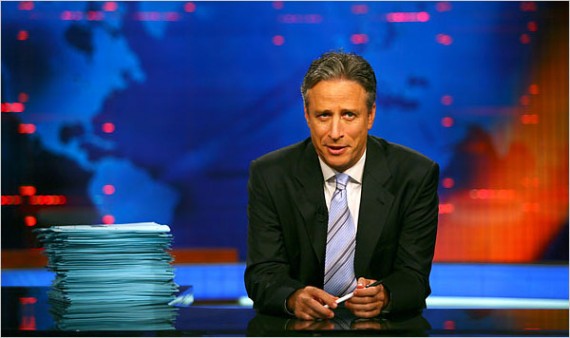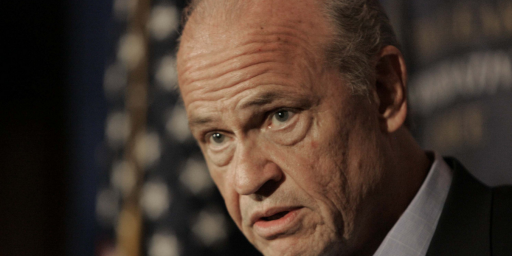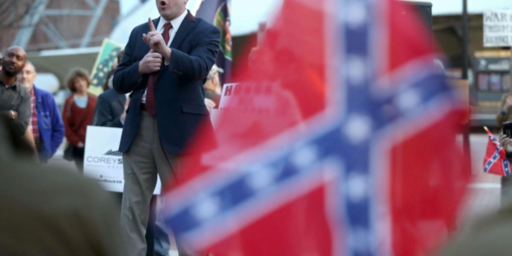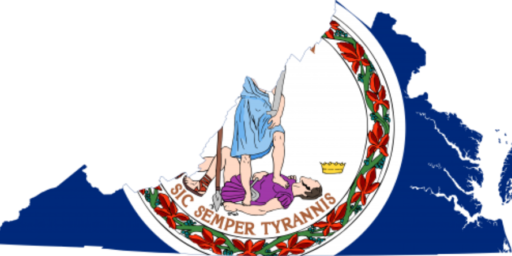Jon Stewart As Edward R. Murrow?
Is Jon Stewart the next Edward R. Murrow? No.
When Republicans in the Senate used parliamentary procedure to block a bill to provide health benefits for 9/11 First Responders, a story that the media all but ignored, Jon Stewart used the last 2010 episode of The Daily Show to bring the full force of ridicule to the story:
| The Daily Show With Jon Stewart | Mon – Thurs 11p / 10c | |||
| Worst Responders | ||||
|
||||
Stewart also interviewed several of the First Responders involved in advocating for the bill:
| The Daily Show With Jon Stewart | Mon – Thurs 11p / 10c | |||
| 9/11 First Responders React to the Senate Filibuster | ||||
|
||||
Today, The New York Times compares Stewart’s role in getting the bill passed to the journalism of Edward R. Murrow:
Did the bill pledging federal funds for the health care of 9/11 responders become law in the waning hours of the 111th Congress only because a comedian took it up as a personal cause?
And does that make that comedian, Jon Stewart — despite all his protestations that what he does has nothing to do with journalism — the modern-day equivalent of Edward R. Murrow?
Certainly many supporters, including New York’s two senators, as well as Mayor Michael R. Bloomberg, played critical roles in turning around what looked like a hopeless situation after a filibuster by Republican senators on Dec. 10 seemed to derail the bill.
But some of those who stand to benefit from the bill have no doubt about what — and who — turned the momentum around.
“I don’t even know if there was a deal, to be honest with you, before his show,” said Kenny Specht, the founder of the New York City Firefighter Brotherhood Foundation, who was interviewed by Mr. Stewart on Dec. 16.
That show was devoted to the bill and the comedian’s effort to right what he called “an outrageous abdication of our responsibility to those who were most heroic on 9/11.”
Mr. Specht said in an interview, “I’ll forever be indebted to Jon because of what he did.”
Mr. Bloomberg, a frequent guest on “The Daily Show,” also recognized Mr. Stewart’s role.
“Success always has a thousand fathers,” the mayor said in an e-mail. “But Jon shining such a big, bright spotlight on Washington’s potentially tragic failure to put aside differences and get this done for America was, without a doubt, one of the biggest factors that led to the final agreement.”
Though he might prefer a description like “advocacy satire,” what Mr. Stewart engaged in that night — and on earlier occasions when he campaigned openly for passage of the bill — usually goes by the name “advocacy journalism.”
There have been other instances when an advocate on a television show turned around public policy almost immediately by concerted focus on an issue — but not recently, and in much different circumstances.
“The two that come instantly to mind are Murrow and Cronkite,” said Robert J. Thompson, a professor of television at Syracuse University.
Edward R. Murrow turned public opinion against the excesses of Senator Joseph McCarthy in the 1950s. Mr. Thompson noted that Mr. Murrow had an even more direct effect when he reported on the case of Milo Radulovich, an Air Force lieutenant who was stripped of his commission after he was charged with associating with communists. Mr. Murrow’s broadcast resulted in Mr. Radulovich’s reinstatement.
Walter Cronkite’s editorial about the stalemate in the war in Vietnam after the Tet Offensive in 1968 convinced President Lyndon B. Johnson that he had lost public support and influenced his decision a month later to decline to run for re-election.
Though the scale of the impact of Mr. Stewart’s telecast on public policy may not measure up to the roles that Mr. Murrow and Mr. Cronkite played, Mr. Thompson said, the comparison is legitimate because the law almost surely would not have moved forward without him. “He so pithily articulated the argument that once it was made, it was really hard to do anything else,” Mr. Thompson said.
There were a lot of factors at play in the debate over the First Responders Bill, of course. Not the least of them being the pledge that Republicans had made to block any legislative action until a deal had been reached extending the Bush tax cuts. Nonetheless, it’s largely true that the media was ignoring the bill itself as well as the GOP filibuster. Once Stewart did a show on it, though, that changed, although it was largely the case that the media was reporting on Jon Stewart doing a show about the bill rather than the bill itself. Would the bill have passed without Stewart getting involved? We’ll never know that, of course, but it certainly seems likely that it’s true
There is a problem with Stewart’s approach to this issue, of course. both segments from the December 16th show are little more than a emotional appeal that boils down to the question how dare we not give money to these people? As James Joyner noted earlier this month, though, there are some serious questions about a bill like this notwithstanding the emotional resonance of September 11th:
I happen to think that the costs for city workers whose health was damaged in the line of duty ought to be the responsibility of the city rather than federal taxpayers. And I opposed the massive compensation package we paid to the families who were the victims of the attacks, reasoning that they’re no more deserving of federal money than other murder victims.
I tend to agree. Of course, given the emotionalism of the Stewart argument, that just makes someone sound like a heartless bastard. That’s not journalism, it’s activism. I happen to be a huge Daily Show/Colbert Report fan, but when people start mistaking what they do for serious journalism, we’ve got a problem.






Too late, he already is.
…when people start mistaking what they do for serious journalism, we’ve got a problem….
As opposed to the serious journalism of Glenn Beck or Sean Hannity? We have a problem compared to what?
Doug,
Prior to this article, I would have testified to any jury that you were a liberal hack.
You’ve just established reasonable doubt.
Is he the one mistaking his work for serious journalism, or the NY Times? I think if someone told him he was the modern day Edward R. Murrow, he’d break down in laughter.
“I happen to think that the costs for city workers whose health was damaged in the line of duty ought to be the responsibility of the city rather than federal taxpayers.”
Sorry guys, but this is one of the few opinions that you guys have that can be unambiguously characterized as “just plain dumb”.
Maybe it should have also been the sole responsibility of the NY Police Dept. to go after al-Q and take out the Taliban as well?
As to your large point – Murrow was very much an advocate for various points of view, as well as being a journalist (ever see “Harvest of Shame, for example?). I think you are constructing a strawman.
There was something odd about this bill. Lots of unsubstantiated emotionalism but no victims to parade before the cameras. So really Stewart just went with an activist emotional platform to bolster his buddy Rep.
WhinerWeiner.Then I read Megan McCardle’s take on the bill. She’s probably right that it was really just a bill to see who pays. It is disturbing that NYC took over the captive insurer set up to handle the non-public employee claims. I wonder how much cash the city has siphoned off?
Stewart was on Rachel Maddow’s show a month or so ago and I happened to catch it. He very explicitly rejects the idea that he’s a journalist or a political activist, insisting that he’s a mere clown. I happen to think that’s BS — he’s more than that and knows it — but I agree that he’s not Murrow, either.
For one thing, in going after McCarthyism, Murrow was taking a huge risk — going after a popular politician whose cause was arguably just. (McCartyism was vile but anti-Communism was quite legitimate.) Stewart, by contrast, was pandering to the public on an easy issue. There’s hardly a more sympathetic group in the country than 9/11 responders.
Ironically, Stewart was much more Murrowesque a few months back on the Ground Zero Mosque issue, pointing out the silliness of the public’s anger over something they didn’t really understand.
No, Keith Olbermann is the new Edward R. Murrow. Honest. Just ask him. He’s even appropriated Murrow’s signoff.
I disagree with the argument that it is the city’s responsibility. 9/11 wasn’t an attack on New York. It was an attack on the USA, targeted in part on New York. It was bigger than the city — even New York — should have to handle. Handling situations like that — an attack on the nation — is one of the most important (and legitimate) duties of the federal government.
I did hear some questions that troubled me, though. Apparently a lot of money has already been allocated for this situation, and there are some serious questions about how that has been spent and accounted for. As cold as it may sound, I’d like to be assured that this money will actually go to benefit the rescue workers, and not just disappear like previous funds may have. And that was one objection I heard that actually struck me as valid.
I’d like to see an actual accounting for that money, and serious jail time for anyone who decided to skim off some for themselves.
J.
I respectfully disagree with the implication that the responsibility of 9/11 responders’ health should fall under the purview of the people that have been listed, including NYC (what Mr. Joyner and Mr. Mataconis are implying), charity (right, that always works…) and unions (are you serious? Libertarians pushing something onto a group of people they spend all of their waking lives trying to destroy?). The entire federal government, including the military, was dragged into 9/11 and the aftermath when we decided to fight a war in Afghanistan (OK, I guess that’s acceptable) and Iraq (cue Scooby Doo going “rearry?”). Furthermore, 9/11 was used as the hammer to smack down any objections to not only our wars and our increasing, sickening jingoism, but also changes to policies that significantly lowered our personal liberties such as the Patriot Act. “You’re against the Patriot Act? So you’re saying you want THE TERRORISTS to hit us again?”
I disagreed with all of these things. But then for us to say all of this as a country – even people in Nevada were for “getting” people for what they did to New York* – and then say that we shouldn’t pay for the health issues of people that were the first ones into that mess – a mess that is not in their daily itinerary, by the way – is short-sighted and borderline selfish. Granted, the people that go into these catastrophes – of which I was one, as a former serviceman and former firefighter – aren’t going to stop going in because of things like what we’re debating. But for us to expect these things from these people, play up their accomplishments, champion them when we want something (to go to war, to not have an Islamic community centre, etc.) and then toss them aside is flat out wrong.
Considering what the federal government did with them, I have to advocate giving them the funding they need.
* – I know the Pentagon was attacked, but no one outside of the military seems to give a shit.
I think the problem in discounting Stewart as a Murrow of our time, is the “of our time” part.
Context is everything. If there were a true Murrow now, would he have a show? If he had a show, would anyone tune in?
Stewart taps a big-city cynicism that is endemic, and the path to modern audience.
> Apparently a lot of money has already been allocated for this situation, and there are some serious questions about how that has been spent and accounted for. As cold as it may sound, I’d like to be assured that this money will actually go to benefit the rescue workers, and not just disappear like previous funds may have.
If you have anything beyond innuendo, lets see it. At this point, it sounds like you are just carrying water for the GOP members who disgraced themselves on this issue.
Stewart has gone to great pains to avoid claiming what he does as journalism, despite the Peabodys he has won. To my knowledge, he has never claimed to be the next Murrow or Cronkite. So you can’t lay that mantle at his door.
As to the bill itself, as much as the nation has used 9/11 to justify just about everything, I think it is safe to say that it was not just an attack on New York, also an attack against the nation. Yes, let the nation pay the first responders medical bills for life.
Doesn’t this also cover the first responders to the Pentagon and the Pennsylvania flight? If not, why not?
Christopher, that’s because the Pentagon is a valid military target. Being a bullseye is pretty much part of the building’s — and occupants thereof — job description.
That the terrorists were illegal combatants using illegal tactics — “perfidy” and “deliberately using civilians,” among other offenses — doesn’t completely discount it.
It’s not nice to say, but it’s true.
J.
I think the argument that the entire cost should fall on New York City is simply asinine.
We have treated this as an attack on the United States. An act of war. If this were a Soviet nuclear attack on Washington DC would you be arguing that the cost should be borne entirely by the taxpayers of Washington DC?
How about we roll it back further and postulate a successful German naval attack on, say, Charleston. Or a Japanese attack on San Diego. Those would be local matters?
Let’s consider some possible future scenarios: an Iranian suitcase nuke set off in Denver. No federal money there? A North Korean nuke hitting Honolulu. That’s a local matter? Up to the surviving Hawaiian taxpayers to handle?
Kindly explain why federal funds should be used in one act of war and not in another. And if a foreign military attack on any part of the United States is not a federal matter, kindly explain just what the hell we have a federal government for?
Sometimes you boys just end up revealing the shallowness of conservative ideological thinking.
Conservative super-patriots in states Al Qaeda never heard of wet their pants and clutch their hunting rifles as their fevered heads fill with fantasies of the end times.
Meanwhile New Yorkers — like Jon Stewart — are actually trying to help the guys with the stainless steel balls who walked toward the WTC.
Naturally this engenders abuse from the first group.
Nice broad brush you got there, Michael. Home Depot having a special?
I’m a lifetime resident of one of those tiny, obscure states (except for every four years, during presidential primary season). I stated that the 9/11 responders are owed a debt by the nation, as represented by the federal government. And I don’t recall hearing too many voices saying “it’s New York’s problem, let them deal with it.” The only objections I heard were “let’s make sure it’s paid for, as in the Democrats’ ‘pay-go’ policy” and “let’s not just throw money in their general direction, but make certain it actually goes to benefit those who deserve it and need it.”
Hope you kept the receipts for those brushes, chum.
J.
He’s the canary in the coal mine of journalism. What’s the lobster in the pot of cold water recipe?
>”As James Joyner noted earlier this month, though, there are some serious questions about a bill like this notwithstanding the emotional resonance of September 11th:
>”I happen to think that the costs for city workers whose health was damaged in the line of duty ought to be the responsibility of the city rather than federal taxpayers. ”
Jay tea: Mr Reynolds was not talking about you, he was talking Doug M, and JJ, as per DMs quote above.
tom p:
Shhh, don’t tell him the whole world doesn’t revolve around him.
I agree with Mataconis in that Stewart was much more of an Olbermann-esque activist for the legislation than a Murrow-esque investigative reporter. Check out my blog post at http://bit.ly/eupkTN, and I’d love to hear your thoughts.
Jon Stuart… More like Roseanne Roseannadanna!